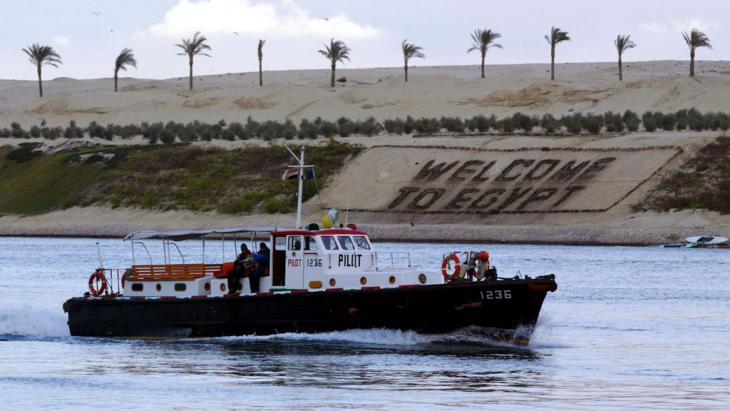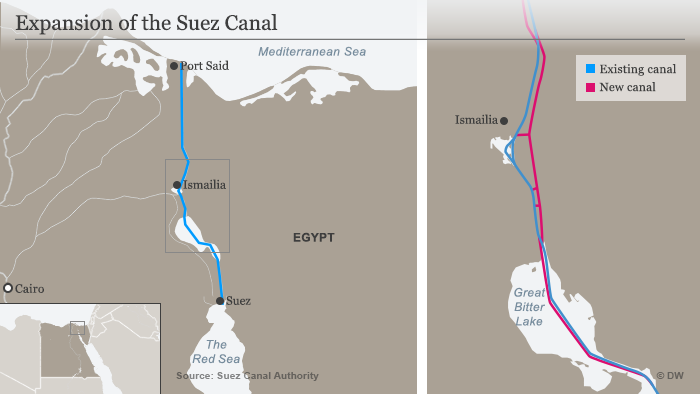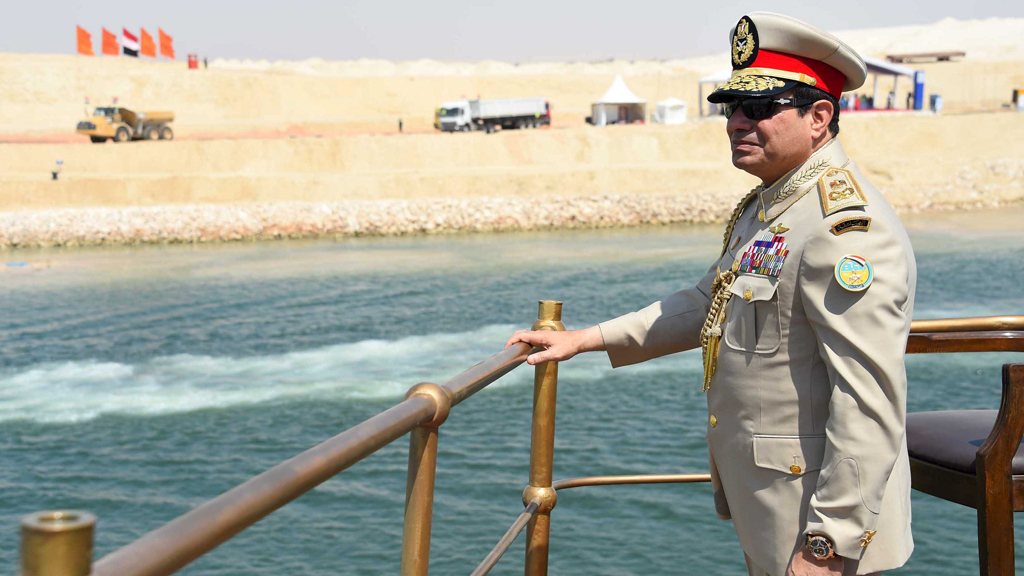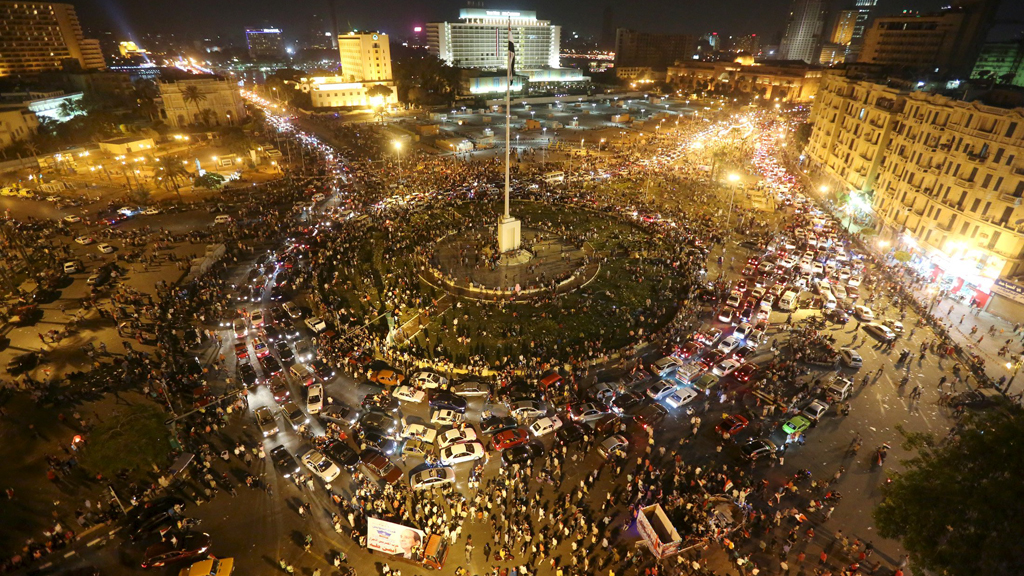A drop in the ocean?

Anyone arriving at Cairo airport these days can have a special stamp printed on his or her travel papers at passport control: "New Suez Canal – a gift from Egypt to the world" are the words written beneath the canal logo. The publicity campaign comes as part of the official celebrations to mark the opening of a new stretch of the Suez Canal on Thursday, 6 August 2015. Trailers have been running incessantly on Egyptian television extolling the "New Suez Canal" as a symbol of the will of the Egyptians. In the nation's social media too, it is virtually impossible to evade the event. For example, a video has been posted on YouTube showing a group of swimmers pulling a five-kilometre-long Egyptian flag through the new canal extension.
During a press conference in Cairo a few days before the opening, the head of the Suez Canal authority Muhab Mamish spoke of the event in grandiloquent terms: "With the 'New Canal' we are passing from the darkness to the light; our thanks is due to the initiator of the project: President Abdul Fattah al-Sisi."
And when Egypt's president opened the canal extension, the aim was to ensure that celebrations would be on a par with those almost 150 years ago when the original Suez Canal was inaugurated. The royal yacht "Mahrousa", which once carried the Vice Regent Ismail Pasha and his guests from all over the world along the new waterway, was transferred to the Suez Canal especially for the ceremony. Sisi emulated the actions of his royal predecessor and sailed along the new extension with his official guests.

Reminiscent of the Nasser era
As if that weren't enough, the fact that the Egyptians have themselves financed, planned and built the new extension is intended to recall those glorious days when President Gamal Abdel Nasser nationalised the canal in 1956, thereby ushering in the end of colonialism in Egypt. People in Egypt are especially proud of the fact that the "New Suez Canal" has been completed in just one year. The construction period was originally scheduled over three years, but in a highly effective press conference announcement last summer, President Abdul Fattah al-Sisi instructed his army and the Suez Canal authority to complete the project in just one year.
Once the entire undertaking had been declared a major priority under army supervision, work on the canal began around the clock. A total of 258 million cubic metres of sand were shifted, and 4,500 heavy construction vehicles were in operation.
Many Egyptians are also very proud of the fact that the cash required for the project, which amounted to US$8.5 billion, was mobilised in just a week last summer by private Suez Canal investment certificates. After five years, it is hoped that the invested cash will be repaid at an interest rate of 12 per cent.
Retired engineer Nagi Aschmawi bought Suez Canal certificates to the value of €12,000 for his two-year-old and five-year-old grandchildren. "So that their names will one day be associated with the Suez Canal and so that we are involved in this historic project," he explains. "This project is being financed by the Egyptian people, and we didn't want to miss out," he adds. He also says he did it out of defiance, to show those who always maintain that this national project is nothing more than a small irrigation channel. Of course, the 12 per cent interest was an attractive prospect too.
Both the claims that the project is really nothing more than a minor irrigation channel and those that exaggerate its importance, are not a reflection of reality. The entire Suez Canal is around 200 kilometres long. Previously, it was passable along an 80-kilometre-long stretch on both sides simultaneously. Now, the parallel accessibility has been extended to 115 kilometres. This involved building a 35-kilometre-long section in the desert, and widening and deepening another 37-kilometre-long section, so that 60 per cent of the canal is now passable in parallel.
"We have a message for the world: your food, your medicine, your fuel and your spare parts will arrive more rapidly thanks to the new Suez Canal concept," explained the head of the Suez Canal authority during the press conference that was called after three container ships completed a successful test voyage. To provide a better idea of what "more rapidly" really means: with the original canal built 150 years ago, the time needed for a voyage by boat from the Arabian Gulf to London was shortened from 24 to 14 days. With the new parallel transit extension, the waiting time for ships is shortened from between eight and 11 hours to just three hours.

Time is money
But in the shipping trade, time is money. The fact that 10 per cent of global trade currently runs via the Suez Canal means that the project has potential, believes Egyptian political economist Amr Adly. But no one can say at the present time whether that potential is as great as the government in Cairo is claiming. The government predicts that with the new shipping channel, canal revenues will increase by 260 per cent over the next nine years. "How rewarding the extension actually is depends on the development of global trade. The Egyptian government has so far not published any kind of study to back up its figures. That makes it difficult to evaluate the project. There will certainly be additional revenues, but no one can reliably say how high these are," says Adly.
But at any rate, even without the extension, revenues from the Suez Canal have doubled over the last decade to $5.3 billion, although the significance of the Canal for the Egyptian economy is often over-estimated. "Although many people think otherwise, Suez Canal revenues do not make up a large part of Egypt's public revenue, but only about four per cent," explains the Egyptian economist. "But the canal brings foreign currency to Egypt. And that makes it vital for the state," he continues. "Egypt's total exports represent less than US$30 billion. So the canal's importance lies in the fact that it alone gives the state a sixth of its foreign currencies."
Adly says he is impressed at how this section of the canal was completed within such a short time, in what has been an unprecedented co-operation project between the military and public and private Egyptian companies. But specialised companies from The Netherlands and Belgium, commissioned to carry out the complex work involved in extending and deepening the existing canal, were also involved in the project to a considerable degree. The project was completed outside the remit of an Egyptian state apparatus, which is notorious for its inefficiency, on a kind of extraterritorial building site that has little to do with the realities of life in the rest of the nation.

No plan for sustainable economic development
Even though the economic projections for the project are still a matter of conjecture, Sisi can claim the opening of the second shipping channel as a political success. "Through this, the leadership in Cairo can prove that it can achieve something – within a short time scale as well," says Adly. But he warns against the erroneous belief – fuelled by state media – that a single large-scale project such as this can power up Egypt's sluggish economy. "This project will not have a reforming effect on the Egyptian economy and enhance its performance, thereby creating a huge number of new jobs and raising the living standard of the Egyptian people," he believes. "The state and the military may be capable of getting a major infrastructure project up and running, but there's no plan for a development; no package of measures with a particular goal," he says.
He sees Egypt's inefficient public institutions as the main problem. "The current regime is facing a huge dilemma because it needs to reform the very public institutions that support the system. In other words, it must force its own allies to change," Adly concludes.
If all goes according to the plans of the military government in Cairo, the newly opened section of the Suez Canal is just the beginning. There are also plans to lure foreign investors to support a mega logistics centre on the canal. But there have so far also been no reliable studies on the viability of such a project. "The lack of transparency has a great deal to do with the legacy of the old paternalistic style of government. It's like the relationship between a father and his children. The state wants the best for its children without having to discuss matters with them," explains Adly.
Karim El-Gawhary
© Qantara.de 2015
Translated from the German by Nina Coon
